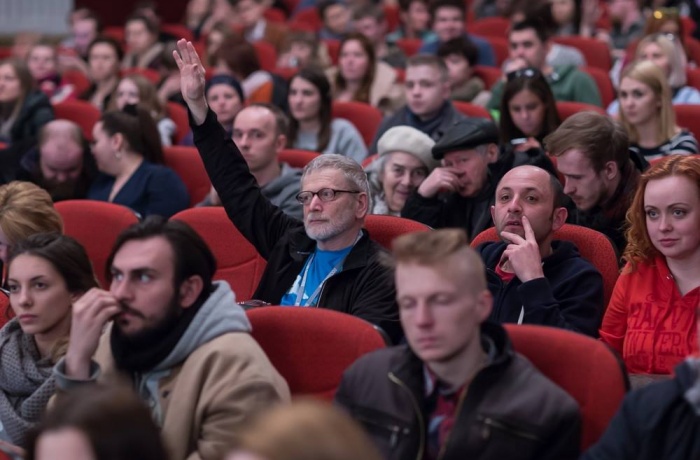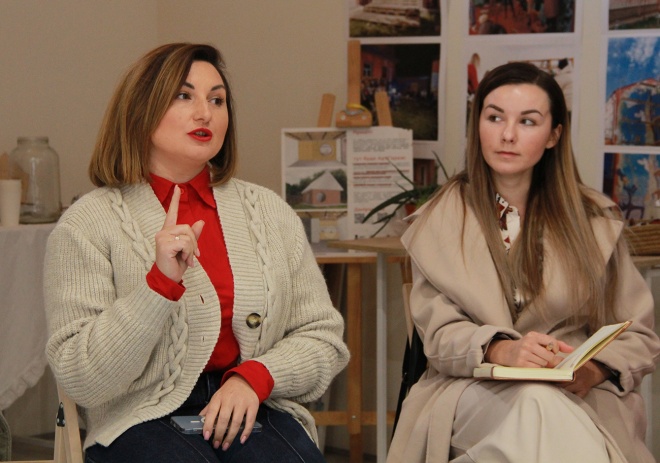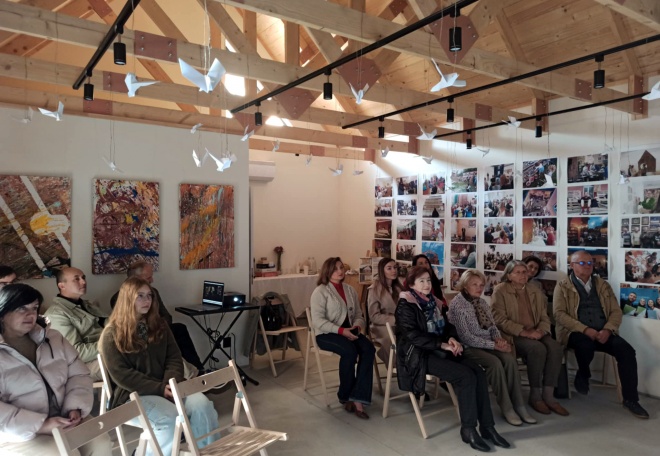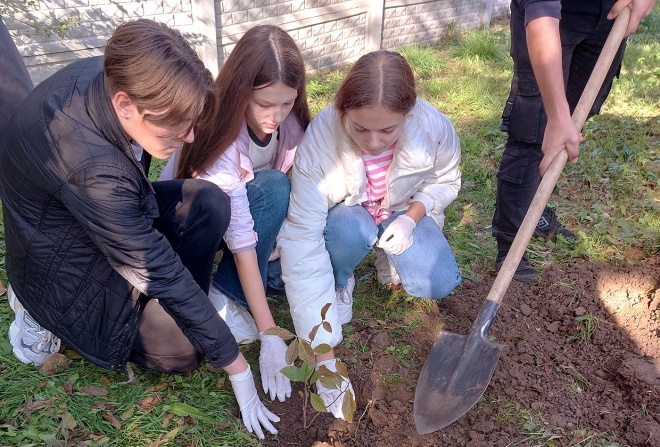Cherishing the fragile in the time of crisis: The 2024 Travelling Festival took place in Ternopil region
Cherishing the fragile in the time of crisis: The 2024 Travelling Festival took place in Ternopil region

On October 16, the 21st Docudays UA International Human Rights Documentary Film Festival set off on its traditional autumn journey through the cities and towns of Ternopil region. The first event of the festival took place at the Ternopil Volodymyr Hnatiuk National Pedagogical University, after which the Travelling Festival visited the Ternopil Regional Scientific Library, as well as the towns of Chortkiv, Husiatyn, and Zalishchyky.
Here are some impressions on the 21st Travelling Docudays UA in Ternopil region.
The festival organizers emphasize that the main theme of this year's festival is historical memory.
It was dedicated to reflections on our memory and attempts to recreate and restore its erased or forgotten pages. Other crucial topics were also discussed at the festival: violence in the family, in the country, and on the Internet, abuse of children, as well as decommunization and fostering unity within the country. Perhaps we should start the conversation about historical memory by asking what we mean by it. Whose memory is it: that of a family, a clan, a tribe, an ethnic nation, or a political nation?
Screenings of the documentaries were also an attempt to understand how and why freedom sometimes breaks into shards like a fragile crystal? And what is necessary to fix those shards of freedom back together?
On the first day of the festival, October 16, the community of the Volodymyr Hnatiuk Pedagogical University in Ternopil attended a festival event on the occasion of the 140th anniversary of the birth of Father Omelyan Kovch, great humanist, righteous man of Ukraine, Greek Catholic missionary priest and blessed martyr.

The 21st Travelling Docudays UA in Ternopil region
Subsequently, the festival visitors watched the film Caught in the Net (dirs. Barbora Chalupová, Vit Klusák) and discussed the dangers of the modern virtual world. October 16 was the day of the information campaign “Sexual abuse on the Internet: how to protect children” with participation of experts.
On October 17, the festival was hospitably hosted by the Ternopil Regional Universal Scientific Library, which has been a long-time partner of the Travelling Docudays UA in Ternopil region.
One of the items on the program of that day was the screening of The Kyiv Files by Dutch director Walter Stokman. Walter Stokman's work was a deep and insightful experience for the audience, and the content of the film was also informative for the generation that still remembers the times of the Communist Party dictatorship and life under the watchful eye of the KGB. The audience discussion centered around the necessity for state and public control over the activities of the special services today. According to the audience, no country, especially one at war, is immune to the resurrection of totalitarian practices.
On October 18, the first special online event in the program of the 21st Travelling Docudays UA in Ternopil Region took place – another screening and discussion of the Czech documentary Caught in the Net. This time, the film was screened for lawyers of the Western Interregional Center for Free Legal Aid, which coordinates legal aid activities in seven regions of Ukraine.
Mariana Hevko, psychologist of the Ternopil Barnhaus Center, coach, and expert of the International NGO “International Center for Development and Leadership”; Iryna Kryva, head of the Chortkiv Department of Free Legal Aid; and Maria Gambal, head of the Southwestern Department of Free Legal Aid of the Western Interregional Center, provided their expert comments. The discussion was moderated by Oleksandr Stepanenko.
During the discussion, experts shared their advice for lawyers, psychologists and parents on how to protect children from contact with potential abusers on the Internet.
The organizers of the Travelling Docudays UA in Ternopil region did not hesitate to include into the schedule both online and offline screenings of Kiosk, the debut feature film by young director Daniel Stopa; what is more, they have even organized Two Days of Polish Cinema at the Travelling Docudays UA.
The organizers have long dreamed of taking both their films and viewers on a journey and inviting guests from other cities to the festival events. In Ternopil, the dream came true: the audience of the Library on Zelena Street hosted guests from Zalishchyky. The event was also attended by experts Taisa Rubanyak, lawyer, expert on preventing and combating domestic and gender-based violence, and founder of the NGO For Women, and Yuliya Vorobel, psychologist, psychotherapist, and co-founder of the NGO For Women.
The long day at the Library on Zelena Street ended with a screening of the film Boots on the Ground, Hands in the Soil by Karolina Uskakovych. We discussed changes that are necessary in Ukraine in order for Karolina and our other fellow citizens to return home. What should be done to turn Ukraine into a republic of free citizens, where people consciously protect and support the state, and the state protects and cares for them; where human diversity is considered a wealth, not a threat; where opponents and people of other languages and faiths are not considered enemies; and where no goal justifies the neglect of human dignity.

The 21st Travelling Docudays UA in Ternopil region
The day at the Library on Zelena Street was intense; by the way, its courtyard is now decorated with a juniper sapling from the Travelling Docudays UA, which survived the prolonged heat and droughts this summer.
The Polish Film Days at the Traveling Docudays UA also took place online. The Kiosk by Daniel Stopa, the most paradoxical film of this season, stirred up a wave of discussion, which has even turned into personal correspondence and lasted for several days.
This time, the guest of the Polish Film Days was Volodymyr Kaplun, who has been organizing the Travelling Festival in Kharkiv since its very beginning. Younger viewers, such as Iryna Spolska, student of the “Ridna Shkola” gymnasium, also participated in the discussions.
October 22 was the Day of the Short Film by the Travelling Docudays UA in Ternopil region – specifically, in Husiatyn over the Zbruch River. This time, the schedule of events in Husiatyn included two films: a student work by Karolina Uskakovych Boots on the Ground, Hands in the Soil and the film Girl Away From Home by Simon Lereng Wilmont and Alisa Kovalenko.
After the screening, we had a discussion on whether we should count on rebuilding Ukraine as it was before the war, or do we have to think about a fundamental reboot of the Ukrainian statehood project?
Later, the Travelling Docudays UA in Ternopil Region visited the Zalishchyky State Gymnasium, where, among other things, the short film Nelson the Pig was screened.
The Dutch film Nelson the Pig, despite its unusual plot, was well received by the students of the gymnasium. Whether it's an animal that is unusual in the urban landscape or a person with different views, lifestyle, values, language, and faith, overcoming prejudice always begins with establishing communication and trying to understand the other. This is followed by mutual understanding and a sense of responsibility, especially for “those whom we have tamed.”
The discussion was moderated by Vasyl Dyakiv, teacher of history and civic education, Honored Teacher of Ukraine, winner of the national Global Teacher Prize Ukraine-2020.The program of the Travelling Docudays UA at the Zalishchyky Gymnasium ended with the Mila Sandberg Memorial Day in her native town, which was a symbolic memorial event in the context of the main theme of this year's festival, dedicated to historical memory.
Mila Sandberg-Mesner (1923-2023) was originally from Zalishchyky. At the age of 19, she escaped the tragic events of the Holocaust. Later, in her exile overseas, she began writing and became the author of the memoir Light through the darkness. On her initiative, in 2011, a place of remembrance for the Jewish community that perished during the Nazi occupation was established in Zalishchyky.
Last year, Mila died in Montreal, a few days shy of her 100th birthday. Her friends and family launched an international commemorative initiative to plant “Mila Sandberg trees of remembrance.” Her hometown on the Dniester river, where she spent her childhood and which she described with touching warmth and love in her autobiography, could not but become a place to plant a tree in her memory.
Anatoliy Podolskyi, director of the Ukrainian Center for Holocaust Studies, historian, publisher, and public figure, joined the discussion of the formation of a culture of historical memory and the experience of the Ukrainian Center for Holocaust Studies online. In addition, the gymnasium audience saw a presentation about Mila Sandberg and the Ukrainian edition of her memoir, Light through the darkness.
The meeting ended with the planting of a symbolic “Mila Sandberg Tree of Remembrance” with the participation of students of the Zalishchyky State Gymnasium and students of the Zalishchyky College. The magnolia tree is still very small and fragile, but it is already a living monument to the people whose lives were taken away by a hateful regime 80 years ago. In order to grow and become stronger, it needs our care and protection, just like memory itself. But we believe that one day our “Mila Sandberg tree” will bloom.

The 21st Travelling Docudays UA in Ternopil region
So what is historical memory after all?
The historical memory of a modern political nation differs from the tribal memory: the former one is less homogeneous and is tied to material entities such as family, land, and housing. In modernity, memories combine and differ: they are related to different ethnicities, religions, languages, regions, social groups, have different historical experiences, cultural heritage, and writing systems, and belong to different state formations at different times.
In order to stitch these fragments together, we must adopt fundamental values that will enable us to create a new unity in diversity. Indeed, one of these values is our understanding of human dignity and human rights. They can unite us both in our own country and in the common European home of free states and peoples, which we want to be a part of without threats to our own existence.
See you next time at the Travelling Docudays UA in the Ternopil Region!
Source: Travelling Docudays UA in the Ternopil region
The 21st Travelling Docudays UA is supported by the Embassy of Sweden in Ukraine, the Embassy of the Kingdom of the Netherlands in Ukraine, and International Media Support. The opinions, conclusions or recommendations do not necessarily reflect the views of respective governments or charitable organizations of these countries. The author(s) of this publication are solely responsible for its content.












